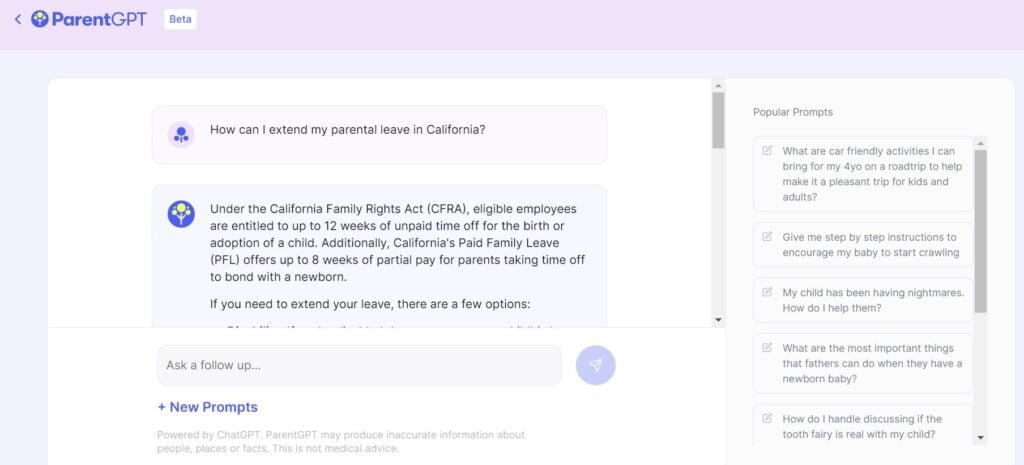In the wake of the explosion of ChatGPT and AI-powered chatbots, companies have recognized the potential of entering various sectors through AI technology. One such sector that’s benefitted from this innovation is parenting, a realm that offers boundless opportunities to assist and guide parents through the ups and downs of raising children. With the right blend of practical and empathetic advice, parents can find solace, support, and a sense of belonging in their parenting journey.

Amidst the myriad of resources available online, parents often find themselves overwhelmed by the sheer volume of information and the potential for conflicting advice. It’s in addressing this common parental dilemma that Oath Care, a platform committed to connecting parents with caregivers and health experts from pregnancy through a child’s early years, has unveiled its latest offering: ParentGPT.
ParentGPT, Your AI-Powered Parenting Assistant
ParentGPT leverages the power of ChatGPT and is seamlessly integrated into the Oath Care app. Its mission is straightforward: to streamline the process of obtaining high-quality, timely answers to parents’ burning questions. From the complexities of breastfeeding to managing discipline and navigating the challenges of divorce, ParentGPT is ready to provide detailed responses in a matter of seconds.
Camilla Hermann, the co-founder and CEO of Oath Care, has set a higher bar for ParentGPT. It’s not just about doling out expert advice; it’s about creating a haven for parents where they can find shared experiences, support, and a treasure trove of knowledge. This community-driven approach offers a refreshing alternative to sifting through countless and often contradictory search results or relying on influencers who frequently promote products.
However, entrusting an AI chatbot, such as OpenAI’s ChatGPT, for parenting advice also raises some valid concerns and uncertainties. While ParentGPT makes it clear that it’s not a medical advisor, the conversational nature of the tool might lead some users to treat it as one. Although it may seem more private and secure than a conventional search engine or a Facebook page, no company can guarantee immunity against data breaches and hacking.
What Can You Ask ParentGPT?
The beauty of ParentGPT lies in its simplicity. The free-text box invites users to ask any parenting-related question, making it an invaluable resource for a wide range of concerns.

To test its capabilities, Mashable posed various questions, including:
- Why is breastfeeding so difficult?
- How do I discipline my child without traumatizing them?
- How do I balance work and family life?
- How does divorce affect children?
ParentGPT provided insightful answers to each question. It’s programmed to draw information from a curated list of approximately three dozen reputable sources, including the American Academy of Pediatrics, the U.S. National Institute of Child Health and Human Development (NICHD), the UK National Health Service, and the American College of Obstetricians and Gynecologists.
FAQs – Your ParentGPT Queries Answered
Q1: Is ParentGPT a replacement for medical advice?
A1: No, ParentGPT is not a medical advisor. While it can offer general guidance, it’s essential to consult a healthcare professional for specific medical concerns.
Q2: How can I access ParentGPT?
A2: ParentGPT is available through the Oath Care app. Simply download the app and start asking your parenting questions.
Q3: Can I trust the sources ParentGPT draws information from?
A3: Yes, ParentGPT relies on a carefully selected list of reputable sources to provide accurate and reliable information.
Q4: Is my data safe with ParentGPT?
A4: ParentGPT takes privacy seriously, but no system is entirely immune to data breaches. Exercise caution when sharing personal information.
ParentGPT is more than just an AI chatbot; it’s your reliable companion on the parenting journey, offering trusted advice and a supportive community for parents looking to navigate the complexities of raising children.



